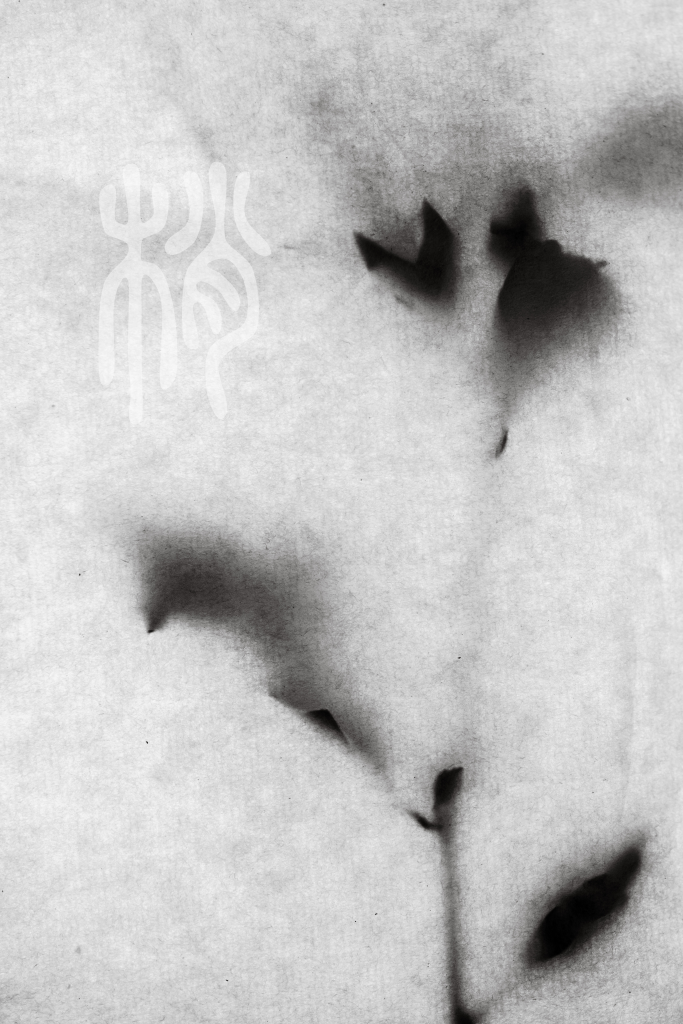
なつ山の 峰のこずゑし 高ければ 空にぞせみの 声も聞こゆる
anonyme
japonais moderne :
夏山の/峰の梢が高いので/空にまで蝉の/声が聞こえてくる
sommet de montagne d’été, si hautes les cimes que les voix des cigales semblent venir du ciel
la hauteur des sommets d’été et de leurs « kozue » — les extrémités des branches, les frondaisons — fait monter le chant des cigales si haut qu’il se perçoit « dans le ciel ». l’image condense la plénitude estivale : chaleur, verticalité, saturation sonore.
notes de langue
• こずゑ(梢) = la cime des arbres, l’extrémité des branches.
• し après 梢 est la particule classique dite « rentai » : on peut la rendre par « …が ».
• ぞ est la particule d’emphase ; par « 係り結び », elle commande ici la forme連体形 de 終動詞 : 聞こゆ → 聞こゆる.
• 聞こゆる signifie « être audible, se faire entendre » (valeur intransitive, sans rapport avec le verbe d’humilité « dire »).
• mesure 5-7-5-7-7 respectée : なつやまの(5)/みねのこずゑし(7)/たかければ(5)/そらにぞせみの(7)/こゑもきこゆる(7).
interprétation
lieu commun classique de la poésie japonaise d’été, qui transforme un bruit banal en moment de grâce et de fusion avec le cosmos.
sans doute moins un 空 bouddhiste qu’un plus haut « céleste », autre monde (terre pure ? lieu d’autres voix disparues ?)
english
peak of the summer mountain, the treetops rise so high that the voices of the cicadas seem to come from the sky.
the height of the summer peaks and their kozue — the outermost branches, the crowns of the trees — lifts the cicadas’ song upward until it is perceived “in the sky.” the image gathers the fullness of summer: heat, verticality, and a saturation of sound.
language notes
• kozue (梢) = treetop, the extremity of branches
• the -shi after 梢 is the classical rentai particle, equivalent to modern が
• zo is an emphatic particle; by kakari-musubi it requires the attributive form, hence 聞こゆ → 聞こゆる
• 聞こゆる = “to be audible, to be heard” (intransitive, not the humble “to say”)
• syllabic pattern 5–7–5–7–7 is observed: なつやまの (5)/みねのこずゑし (7)/たかければ (5)/そらにぞせみの (7)/こゑもきこゆる (7)
interpretation
a classical summer topos: turning an everyday sound into a moment of grace and fusion with the cosmos. here 空 is less the buddhist “void” than a higher “heavenly” realm, another world (pure land? the place of vanished voices?).
日本語
夏の山の峰、梢があまりに高くて、蝉の声がまるで空から響いてくるように思われる。
夏の峰とその梢の高さが、蝉の声を押し上げて、ついには「空」に聞こえてくる。そこには夏の充溢――熱、垂直性、音の飽和――が凝縮されている。
言語注
・こずゑ(梢)=木の一番高い枝先
・梢し の「し」は古典文法の連体助詞、現代語の「が」に近い
・「ぞ」は強意の係助詞で、係り結びにより終止形ではなく連体形「聞こゆる」を用いる
・聞こゆる=「聞こえる、響きわたる」(自動詞)
・五七五七七の定型を守る:なつやまの/みねのこずゑし/たかければ/そらにぞせみの/こゑもきこゆる
解釈
夏の和歌における典型的な主題で、日常の音を宇宙との融合の瞬間に変える。ここでの「空」は仏教的な「空(くう)」というよりも、天上の別世界(浄土か、消えた声の棲む場所か)を仄めかす。

Vous devez être connecté pour poster un commentaire.